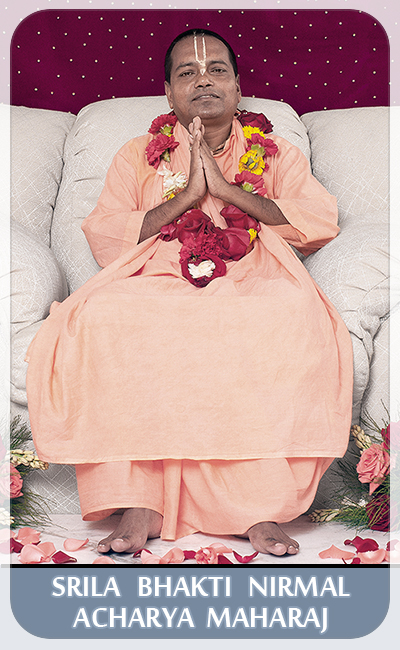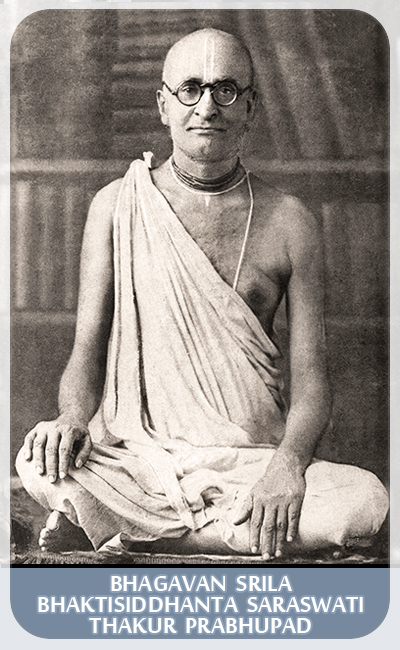Our Disciplic Succession:



|
"The Sun Never Sets on Sri Chaitanya Saraswat Math":
|
| ABOUT US | GUIDANCE | LIBRARY | DAILY PRACTICE | PHOTO | CALENDAR | CONTACT |
— { DIVINE ASPIRATION } —
CHAPTER SEVEN:
THE TEST OF TASTE
Service means to remain in connection with the advice of the Vaishnav, not some activity on the physical plane. Still, activity is necessary sometimes, otherwise in solitary life the memories of so many past incidents come to prey on us, to disturb us. So sadhu-sanga is always recommended, and our bhajan life shall continue on that basis. That is a safe and fruitful foundation for us. Krishna gives His assurance:
sarva-dharman parityaja mam ekam saranam
vraja aham tvam sarva papebhyo moksayisyami ma suchah
(Bhagavad-gita, 18.66)
“Just abandon all varieties of religion and surrender exclusively unto Me. I shall protect you from all sinful reactions; do not fear.”
He says, “All the debts you have ever incurred, I shall pay off; there will be nothing for you to worry for. From any position you may join Me, and I shall take the full responsibility because you are My devotee.”
When Srila Swami Maharaj Prabhupad returned from America to India with his first group of disciples, he made them stay in a house somewhere in Vrindavan. Near that place was the ashram of one influential person, a goswami. One of Srila Swami Maharaj’s disciples was seduced by the teachings of that gentleman, and he left his godbrother group to stay with him. Later on, realising his mistake, the disciple came back to Srila Swami Maharaj and prayed before him: “I have made a mistake, but I have come back; please accept me.” Srila Swami Maharaj told him: “Yes, I forgive you. You are my boy. You have committed some mistake, but I forgive you. I accept you. Do not worry. Now go on, continue with your duties.”
Krishna says, “You are Mine; I forgive you. Because you are Mine, you have the right to demand everything from Me! By My own law, I am bound to do anything and everything for you because I am your Owner. You belong to Me, so when you come to Me, to My shelter, I take the whole charge for your past, present, and future. Everything is Mine. It is My responsibility, and I take the risk for that. You may have done something wrong, but you did not know what was right or wrong. You could not understand. I forgive you.” With this spirit, Krishna is appealing: moksayisyami ma suchah. “You won’t have to lament; I take the whole burden for your past actions.” Such is the nature of the Infinite Truth: all-accommodating, all-sympathetic, all-embracing, all-fulfilling.
AKHBAR’S CHOICE
During the reign of the Moghul Emperor Akhbar, there was an exhibition of the deities of all the Hindu Gods. Though Mohammedan by creed, Akhbar was very generous and very kind to all religious conceptions. While visiting that exhibition, Akhbar was proceeding around the hall, inspecting all the representations there and asking the exhibitors: “Who is this god? What are his activities, his pastimes? Where did he descend on earth?” and so on. At one point he came before the figure of Krishna, depicted in Vrindavan playing His flute. After seeing everything in the hall, he remarked to the exhibitors, indicating the figure of Krishna: “Amongst your Gods, this god is the highest of all because He does not have the worry of any management; He is completely free, enjoying His life, playing the flute with no worry about anything. The highest conception of your God is here. He has no cares, no troubles, nothing of the kind. To get His company will be very beneficial!”
This is the nature of Krishna-lila; it is playful. To be engaged in play without anxiety is the highest lila. Krishna shows His pastimes in this world, in bhauma Vrindavan, prapancha Vrindavan, like an exhibition to test our taste, to give an opportunity to taste: “Do you want this?” In that divine exhibition, so many things are shown for our choice. The different lilas of the Lord in His various Infinite Forms and Pastimes come to this world to test our choice: “Do you want this? Or this?” Such opportunity is offered.
KALI OR KRISHNA
Once one vairagi came here to the Math. She was an old woman wearing red cloth, a follower of Siva-sakti. I asked her, “What do you want after death? Do you want Kali? Do you want her association? Do you want to be her maidservant? Or do you want to be with Siva, with his friends or his servants, like Nandi and Bringi? Do you want to become one of them? Do you want to become four-handed, like the servitors of Narayan? Or do you want to become a gopi, or a cowherd boy, wandering in Vrindavan with Krishna or with Nanda and Yasoda? What do you want?”
Hearing this, she answered: “Yes, if it could be so, if such a beautiful life were possible, then I really want to be in Vrindavan. That I like best, not to be in Vaikuntha, nor to be one of the friends or servants of Siva, nor one of the she-maids of Kali who are chewing on the severed hands of her victims, drinking their blood and so many horrible things.”
Then I told her, “If after death the possibility of such a simple, peaceful, beautiful life in Vrindavan really exists, then why do you follow your present path? You just see the ultimate position and consider what is suitable for you.”
So, the exhibition of Krishna’s pastimes takes place here, and the chance is given to us: “What do you really want? What appeals to your innermost heart? See where your taste is, and come forward accordingly for your future attainment.”
HUMAN FORM SUPREME
Of all the pastimes of Krishna, the highest are in the human form:
krsnera yateka khela, sarvottama nara-lila,
nara-vapu tahara svarupa
gopa-vesa, venu-kara, nava kisora, nata-vara
nara lilara haya anurupa
(Chaitanya-charitamrita, Madhya 21.101)
“Lord Krishna has many pastimes, of which His pastimes as a human being are the best. His form as a human being is the Supreme Transcendental Form. In this form, He is a cowherd boy. He carries a flute in His hand, and His youth is just beginning. He is also an expert dancer. All this is just suitable for His pastimes as a human being.”
Correspondingly, the human form in this world is the best for attainment of the service of Krishna in the divine realm. It is for this reason that it is so valuable. The poet Candidas says:
“O brother, please listen:
this human form is above all,
There is nothing above it! I appeal to you all,
Members of the human race: from my heart
I am giving this advice, born of my experience—
Your human form, its pastimes, its movement,
Are the crown in nature’s hall.”
DON’T COMMIT SUICIDE
But the supreme value of human life is misrepresented in a mundane way by those such as the Rama-Krishna sect. They say that to “serve God” means only to serve man and his needs in this world. They claim: “The human being is above all; Chandidas has said so. Therefore, serving man is serving God. We should only serve the fallen souls, the human race, through so many works of welfare.”
But the real value of the human life is clarified by the scriptures. They advise us: “Utilise this human form to attain the divine plane of Krishna’s pastimes. Human life is very suitable to reach that highest plane—it is very similar in many aspects. The human birth is rarely attained, and if you avoid this chance to approach the divine realm through it, you commit suicide. It is not a small mistake you are committing; it is the greatest mistake if you lose this chance—it amounts to no less than suicide. So try for that highest plane. If you lose this birth, there is no guarantee that again you will get a human birth. You may have to take birth as other species of life. Remember the case of Bharat Maharaj! At the time of his death, he had some intense attention for a deer-cub, to whom he had given shelter after it became separated from its mother. He was lamenting, “Oh, who will look after this young one?” In his next birth he became a deer. Such a horrible thing that the impression of the young deer caught him and took such a shape. Such a dangerous position you are all in. So always strive for the higher plane.”
The English poet Longfellow has written:
“Trust no future howe’er pleasant!
Let the dead past bury its dead!
Act—act in the living present!
Heart within and God o’erhead!”
This is the advice of the scriptures: “What the future holds, you do not know. So don’t rely on any future; take the whole responsibility of the present to approach the divine realm and make your human life a success.”
In Manu-samhita it is stated:
vidvabhih sevitah sadbhir,
nityam advesa-ragibhih
hrdayenabhyanujnato,
yo dharmas tam nibhodhata
Those who are well versed in revealed scriptures know and serve the real dharma, the real religion. What should be the symptoms of those sadhus? They are established in revealed truth; they themselves are approved of by the true sadhus.
Then who is sadhu? That is told in this verse, advesa-ragibhih, a symptom of a sadhu is having no sympathy for the achievements of this world. From them, we may know what is dharma.
Also, hrdayenabhyanujnato, the evidence of the heart, which approves from its innermost quarter, says, “Yes! Here I am getting satisfaction.” That is proof of the real standard of dharma, religion. The heart’s response: “Yes, this is what I am searching for; I am searching for these such things.” The heart will say this from within.
DIVE DEEP
Prahlad Maharaj advises:
na te viduh svartha-gatim hi visnum
durasaya ye bahir-artha-maninah
andha yathandhair upaniyamanas
te ‘pisa-tantryam uru-damni baddhah
(Srimad Bhagagavatam, 7.5.31)
He says that we are making too much of the covering of reality; we are devoting our minds to the external coating, bahir-artha-maninah. But we do not dive deep into the eternal substance. If only we were to dive deep into reality, there we would find Vishnu. The most peaceful substance is within, but it is covered, just as milk is covered by cream. We are making much of that cover. The real substance is within, just as fruit is covered by its skin. What we experience at present is the cover, the skin, and we are ignoring the very substance that the cover is protecting.
So, when we get these things from our Gurudev and Mahaprabhu, we think, “Oh, yes! These are heart-satisfying things.” And we will find such things through progressively eliminating the external things. Progress means this process of elimination and acceptance: elimination of the lower and acceptance of the higher. It is dynamic; at each stage of our progress we will find, “Yes, this is what I am really searching for.”
• • •
• (1) The Worship of the Pure Heart
• (2) Connection with the Centre
• (3) The Greatness of the Vaishnava
• (4) Gradations of Theism
• (5) Outer Form, Inner Substance
• (6) The Pull of the Transcendental World
• (7) The Test of Taste
• (8) A Moment’s Precious Grace

Download (epub)
Download (pdf)
 |
“Everybody
has some plan, but Krishna said, 'I have My own plan, and you must go with My plan.'” |
 |
Sitemap | Contact us | About us
